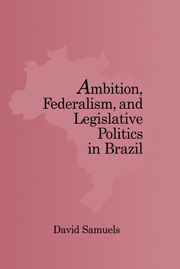Book contents
- Frontmatter
- Contents
- List of Tables and Figures
- Abbreviations and Acronyms
- Acknowledgments
- Introduction
- SECTION I
- SECTION II
- SECTION III
- 6 On the Political (In)Efficacy of Pork-Barreling in the Chamber of Deputies
- 7 Progressive Ambition, Federalism, and Pork-Barreling in Brazil
- 8 Institutions of Their Own Design? Democratization and Fiscal Decentralization in Brazil, 1975–1995
- 9 The Cardoso Administration and Changes in Brazilian Federalism
- Conclusion
- Appendix 1 Coding of Political Positions by Level of Government
- Appendix 2 List of Interviews
- References
- Author Index
- Subject Index
9 - The Cardoso Administration and Changes in Brazilian Federalism
Published online by Cambridge University Press: 28 July 2009
- Frontmatter
- Contents
- List of Tables and Figures
- Abbreviations and Acronyms
- Acknowledgments
- Introduction
- SECTION I
- SECTION II
- SECTION III
- 6 On the Political (In)Efficacy of Pork-Barreling in the Chamber of Deputies
- 7 Progressive Ambition, Federalism, and Pork-Barreling in Brazil
- 8 Institutions of Their Own Design? Democratization and Fiscal Decentralization in Brazil, 1975–1995
- 9 The Cardoso Administration and Changes in Brazilian Federalism
- Conclusion
- Appendix 1 Coding of Political Positions by Level of Government
- Appendix 2 List of Interviews
- References
- Author Index
- Subject Index
Summary
INTRODUCTION
In this chapter I explore the evolution of federalism during the administration of President Fernando Henrique Cardoso (1995–2002). In general terms, the differences between the pre- and post-1994 periods are clear: presidential weakness and governability problems characterized the 1982–94 period, but Cardoso's administration marked the emergence of a more coherent executive branch in Brazilian politics, which enhanced governability. Cardoso controlled inflation and brought relative economic stability, articulated broad congressional support, and passed several important political and economic reforms. In terms of federalism, some have concluded that the Cardoso administration has reversed the decentralizing trend that began toward the end of the military regime (e.g., Abrucio 1998, 231; Abrucio and Ferreira Costa 1998, 77; Affonso 1998; Kugelmas and Sola n.d., 10; Afonso and Mello 2000, 17; Montero 2001; cf. Weyland 2000). If true, this rapid change in policy direction demands explanation, given this book's emphasis on the weight of federalism in Brazilian politics. To what extent is this argument correct?
I explore this question through the concept of “predatory federalism” (Abrucio 1996). Federalism gained increasing importance during Brazil's redemocratization because the presidency lost power while subnational governments gained autonomy (Abrucio and Samuels 1997). As the party system entered a period of high volatility and rapid fragmentation and members of Congress increasingly responded to subnational electoral politics (which preceded national electoral competition by almost a decade), the central government came to depend more and more on state governors to obtain support in Congress.
- Type
- Chapter
- Information
- Ambition, Federalism, and Legislative Politics in Brazil , pp. 177 - 207Publisher: Cambridge University PressPrint publication year: 2003



